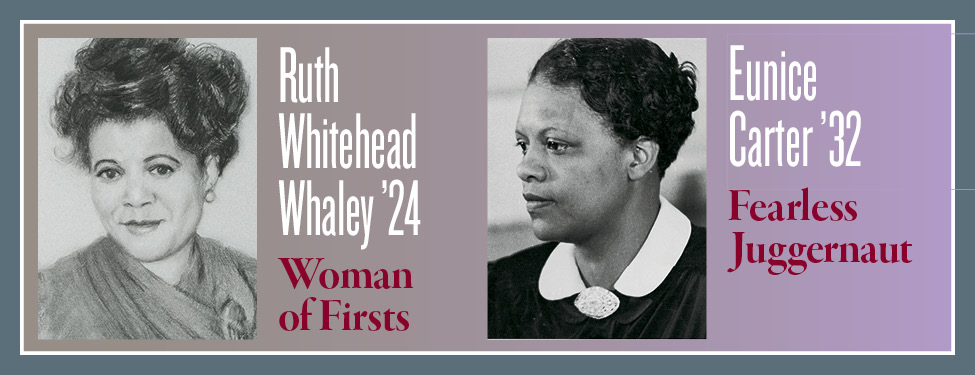Eunice Carter

-
First black woman assistant district attorney in the state of New York
-
Helped convict Lucky Luciano, one of New York’s most notorious mobsters
-
Chief of the Special Sessions Bureau for the New York County criminal justice system
-
Chair of the United Nations’ International Conference of Non-Governmental Organizations
-
Member of the U.S. National Committee for the U.N. Economic and Social Council
Raised in a society with constrained expectations about race and gender, Eunice Carter triumphed far beyond the stifling conventions of her day. Indeed, by the 1940s her professional and political successes had made her one of the most famous black women in the United States.
Carter was born on July 16, 1899, in Atlanta, Georgia, to William Alphaeus Hunton, Sr., the only black international secretary of the YMCA, and Addie Waites Hunton, a social worker. In 1924, she married dentist Lisle Carleton Carter, a Barbadian immigrant who owned Harlem’s most lucrative dental practice. They had one child, Lisle Carter, Jr.
The granddaughter of slaves, Carter earned bachelor’s and master’s degrees from Smith College in Northampton, Massachusetts, where she met and befriended then-Governor Calvin Coolidge. In the early 1920s, Carter was active in the Pan-African Congress, a precursor to the United Nations in which delegates from African countries gathered to discuss how to grapple with colonial rule, racial discrimination, equal economic opportunity, and a host of other issues affecting Africa at the time. Carter briefly worked as a social worker before making the decision to study law. She graduated from Fordham Law’s evening program in 1932, while working full-time as a supervisor in the Harlem division of the Emergency Unemployment Relief Committee.
In 1935, Carter became the first black woman assistant district attorney in the state of New York. Working with special prosecutor Thomas Dewey’s famed “Twenty Against the Underworld”—a team of twenty lawyers Dewey selected to help him fight organized crime in New York City—Carter was instrumental in securing the conviction of Charles “Lucky” Luciano, the most powerful mobster in the country. She was the only member of the team who was not a white male.
It was Carter who first observed that organized crime was likely involved in running major prostitution rings in New York City, and it was this revelation that was the first domino to fall on the way to Luciano’s ultimate conviction. Carter observed in the course of prosecuting prostitutes that most of the defendants were represented by the same lawyers, had the same bondsmen, and often told the same stories, which were usually so convincing that the women were acquitted. Furthermore, a disbarred lawyer named Abe Karp who was reputed to have ties to organized crime was usually present at these trials.
Carter went to Dewey with her theory as he was assembling his team; the special prosecutor was so impressed with her observations that he promptly hired her. After an investigation into Carter’s theory, Dewey ordered raids of over 80 major prostitution houses to pull together prostitutes and madams who would potentially provide information leading to the prosecution of the head of the operation. Out of the over 100 women arrested, only three were willing to talk, but Carter, who conducted the interviews herself, was able to pull together the details of the operation. These details included evidence that Luciano was the head of the entire enterprise. The prosecution was ultimately successful in leading to Luciano’s conviction, as well as the conviction of several other high-ranking organized crime figures.
In 1937, Carter was appointed chief of the Special Sessions Bureau of the New York County criminal justice system by Dewey, thanks in part to her work on the Luciano investigation. As chief, she presided over a department that dealt with over 14,000 misdemeanor cases each year and became one of the highest paid African-American lawyers in the country.
Carter would go on to an illustrious career in international service, which included her attendance at the founding session of the United Nations in 1945. In 1947 she was named a consultant to the UN Economic and Social Council for the International Council of Women and, later, chair of its Committee of Laws. In 1955 she was elected chair of the UN’s International Conference of Non-Governmental Organizations, the highest organization post ever given a woman at the time, and in 1962, she became a member of the U.S. National Committee for the UN Economic and Social Council.
Carter was active in many organizations throughout her life, including the National Association of Women Lawyers, the New York Women’s Bar Association, the YWCA, and the Harlem Lawyers Association. She died on January 25, 1970.
Carter is the subject of the critically acclaimed book Invisible: The Forgotten Story of the Black Woman Lawyer Who Took Down America’s Most Powerful Mobster, written by her grandson, Yale Law professor Stephen L. Carter.